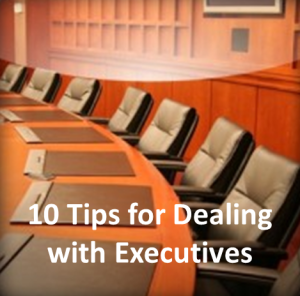If you’re starting out or in mid-career working on your next promotion, getting visibility with the executive team may be your goal.
You might be just itching for the day when you can make that big presentation and show these guys exactly what you’re made of and why YOU should be on the fast track!
As you’re getting ready for the opportunity, however, you’ll need to develop a new skill: working effectively with executives.
Working with execs is not like having a conversation in your team meeting, or even working with your boss. Nope, it’s a whole different level of conversation, and learning how to engage this audience well will enhance your credibility (and viability) in the organization.
Knowing how to work with executives is essential if you plan to move up the ranks.
1. Executives fly at a different altitude.
As with any group or individual, you’ve got to understand your audience to have the most meaningful conversation.
Execs leverage the view horizontally across the whole organization, and connect the dots from top to bottom. You need to understand how your piece fits into their worldview to connect most effectively with them.
2. Execs are experts in issue triage.
They have learned how to quickly dive into the heart of an agenda item, dissect it and ask scathingly good, on-point questions.
Try to anticipate what questions they might ask, and prepare a response. They may not need you to “ramp up” to the conversation. Be ready to get to the heart of it.
3. They expect their scathingly good questions to be answered, directly and succinctly.
One of the biggest gaffes I see in executive conversations is failing to answer the question. You may get so excited about what you have to tell them, that you aren’t listening for what they want to hear. Prepare accordingly, listen and respond. Be concise, clear, and direct.
4. They can smell BS a mile away.
Don’t do it. And if you choose to do it, don’t say I didn’t warn you.
5. They want to know you believe in what you are saying.
Conviction about what you say to an executive is as important as the message itself.
I had one manager who struggled with this. We’d send him in to an executive meeting with program information and this caveat: Whatever you do, don’t blink. One time, he blinked. It wasn’t pretty. You must believe in what you are saying and have conviction that it is the right solution for the organization. Executives will test for conviction.
6. They can cover a lot of territory relatively quickly.
Think cheetah, gazelle or quarter horse. They’ll move quickly until they pull up to focus on an issue. They will drive this, not you. Be deliberate, but prepare to move fast and flex the conversation accordingly. Just because you made all those pretty slides it doesn’t mean they want to look at them.
7. If there’s a flaw in your logic, numbers or content, they will find it.
And they will point it out to you.
Know your back story and your numbers, and the logic behind them. Have someone with content expertise review, poke, prod and test your content – and you – ahead of time. Don’t risk destroying your credibility with bad numbers, or worse – a guess. Do not guess, ever. Say you’ll look into it and come back.
8. They’re impatient. They may be abrupt. Don’t expect a group hug when you leave.
If you’re presenting something, don’t expect flowery kudos when you’re done. They’re moving on to their next agenda item while you’re gathering up your stuff.
9. They remember what you told them.
So don’t tell them anything you don’t want them to remember and remind you of later. See point about not guessing.
10. They don’t subscribe to buzz words.
They want facts, solutions, numbers and conviction. Spare the likes of “paradigm shifts,” “open kimonos” or “eating your own dog food” and stay on topic.
Freaked out? Don’t be. You can do this. It’s just a matter of developing the mindset and doing the footwork. The more prepared you are, the more confident you’ll be. And, it’ll make you better at everything else you do.
And when you’re in there, remember, they were all in your shoes at some point too!

Hi you make some really important points in how graduates should interact with senior execs and partners.
In my work with high potentials I stress the importance of them developing their own “brand” by focusing on the concept of “fitting in – standing out” in terms of understanding the culture (an example of fitting in) and looking for opportunities to showcase themselves (an example of standing out).
Their is a huge learning curve for graduates and this article provides really good pointers as to what will help in the “fitting in – standing out”(FISCO) process
Frank
Hi Frank, thanks for reading, and for your comments! I agree this is an important topic that is often learned through trial and error. And an employee has to understand the gravitas of working with executives. It requires operating at a differently level, and a desire to want to work at that level. It’s not for everyone I’ve found! Thanks for the feedback, I appreciate it! Best, Lea